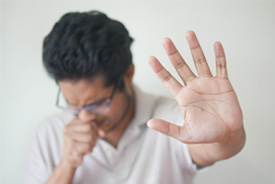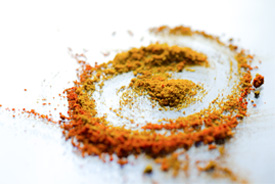
Unproductive Cough
In this article we’ll look at the symptoms, causes and treatments for a tickly cough, as well as some popular home remedies.
Home Remedies for a Tickly Cough
A cough begins when part of your breathing passage becomes irritated or inflamed by foreign matters such as smoke, dust, or mucus.
Table of contents:
- What is a tickly cough?
- How long does a tickly cough last?
- Tickly cough symptoms
- What causes a tickly cough?
- Home remedies for tickly cough
- How to stop a tickly cough at night
- Is tickly cough COVID-19?
- When to see a doctor
What is a tickly cough?
Tickly coughs are usually accompanied by dry coughs, causing a sensation of itchiness and tickliness in your throat. Dry or tickly coughs are sometimes called unproductive coughs as no mucus or phlegm is being produced.
When the throat is irritated (pharynx), the cough is triggered to relieve it. Read our article below for the symptoms, causes and home remedies to get rid of a tickly cough instantly.
How long does a tickly cough last?
Dry coughs often last for up to 3 weeks according to the NHS guide on coughs, and shouldn’t require any specific treatment. See a doctor if you have been coughing for longer than 3 weeks.
Tickly cough symptoms

The most common symptoms that accompany a tickly cough are an itchy throat or sneezing.
You may also experience:
- Sore throat
- Muscular pain in the chest or abdomen from coughing
- Runny nose
What causes a tickly cough?
Coughing is a natural reflex your body has to remove irritants from your airways. A tickly cough is caused by inflammation in the upper airways of the respiratory tract. This inflammation causes a tickly sensation which will make you cough even when you don’t have enough mucus in your lungs. There are many potential causes for a tickly cough:
Viral Infections
This inflammation is often caused by viral infections. If this is the case, the tickly cough may be accompanied by the symptoms of the flu or a cold. Examples of common viral infections accompanied by a tickly cough are: laryngitis, tracheitis and bronchitis.
Atmospheric Conditions
A tickly cough can also be caused by atmospheric conditions such as pollution, dry air, or a sudden change in the temperature.
Allergies

Allergies are a common cause for tickly coughs. Allergic reactions to pollen, mould or food, among others, can cause an itchy throat. If the allergic reaction is extreme, you should see a doctor.
Medical Conditions
Medical conditions such as Asthma or Allergic Rhinitis can also cause a tickly cough. Additionally, a post-nasal drip (where mucus from the sinuses runs down the back of the throat) can cause a tickly cough.
Medications

Several prescription medications can cause a tickly or dry cough, especially those used for high blood pressure or heart conditions.
Home Remedies for Tickly Cough
There are many home remedies to help to relieve the symptoms of a tickly cough:
- Gargling with lukewarm salt water will help extensively to reduce the irritation in your throat. Follow this treatment four to five times a day to soothe your throat.
- Lemon and honey are both renowned for calming a sore throat. Lemon helps to remove excess mucus, and honey coats your throat with its smoothness. Warm a glass of water, add a teaspoon of honey and squeeze a few drops of lemon into it. Drink this mixture slowly twice a day to calm your ailing throat.
- Add turmeric or ginger to your diet as both have antibacterial and anti-inflammatory properties which will help with your tickly cough. You can add the spices to your meal or to hot water.
- When experiencing a tickly cough, your vocal cords and throat go under stress, so try to rest by speaking as little as possible and being gentle with your throat.
- Apple cider vinegar is also considered to be beneficial for a tickly throat. Drinking apple cider vinegar with lukewarm water several times a day might help you lessen the symptoms. You could also try mixing apple cider vinegar into your lemon and honey mixture.
- If you are experiencing coughs caused by allergies, try to avoid the allergens that caused it in the first place. Close contact with the allergens will further aggravate your symptoms. If this isn’t possible, you might want to consider buying antihistamines.
- Steam provides moisture to your throat and unblocks the accumulated mucus in your throat as well as clearing your sinuses. It also relieves dryness that can be the cause of your throat irritation. Try taking a hot, steamy bath or shower. You might also want to try adding a few drops of eucalyptus or menthol into a bowl of steaming water and then inhaling this.
- Try making a thyme tea as it is an effective expectorant (helps bring up mucus and other material from the lungs, bronchi, and trachea) and relaxes your respiratory tract. Drink it twice or three times a day to calm your itching throat. If you don’t like the taste of thyme, there are other ingredients that you could replace it with. Try peppermint, cinnamon or marshmallow root that will soothe your throat or capsaicin found in chilli peppers that will help you cough less (not to be given to children).
- If you are finding it hard to sleep, try sleeping on an incline. By propping yourself up with pillows, you can use gravity to prevent mucus and other irritants building up in your throat when you go to sleep.
- Aloe Vera is also renowned for its soothing properties. Dilute aloe vera juice in warm water, and gargle with this mixture. You can also try drinking this solution to treat your inflamed airways.


Need something stronger?
If your home remedies aren't helping and you need to manage your symptoms, tickly cough medicines can help! They can relieve your symptoms so you can maintain your normal daily routine and sleep.
How to Stop a Tickly Cough at Night
Coughing can be very annoying during the night, interrupting your sleep or preventing you from having a good rest. Although the causes of coughing during the day can also cause it at night, there are some natural remedies that can help target your nighttime cough:
- Using a humidifier to moisturise the air and liquefy your thickened mucus.
- Get rid of allergens. Your cough might be due to allergies, so before you go to bed, dust your bedroom, use air filters and don’t open your windows during hay fever season.
- Sleep on an incline to defy gravity. You can use extra pillows or incline your mattress to avoid throat irritation
- Have a hot drink at bedtime. A hot tea with a little honey can be your best ally at bedtime. It helps soothe the throat and reduce irritation and mucus.
- Take over-the-counter medications for a cough at night. If your cough doesn’t go away with home remedies, you can take OTC medications from renowned brands such as Night Nurse or Benilyn, and an antihistamine to dry up your runny nose. It will stop your night coughing and aid you in getting a restful sleep so that you can feel re-energized in the morning.
Is tickly cough COVID-19?
A dry cough is one of the most common symptoms for COVID-19, however several patients with COVID-19 reported having a chesty cough. Don’t assume you have COVID-19 if you have a tickly cough but take a test to check if you are infected with the virus.
When to see a doctor
If the tickly cough persists or more symptoms appear after trying our home remedies or our tickly cough medicines, you should see a doctor.
Sources:
- Cough, NHS: https://www.nhs.uk/conditions/cough/
- Dry Cough and Chest Tightness, Cleveland Clinic: https://my.clevelandclinic.org/health/symptoms/21888-dry-cough-and-chest-tightness
- Is it True that Honey Calms Coughs Better than Cough Medicine Does?, Mayo Clinic: https://www.mayoclinic.org/symptoms/cough/expert-answers/honey/faq-20058031
- Coughs: Meds or Home Remedies?, Seattle Children's: https://www.seattlechildrens.org/conditions/a-z/coughs-meds-or-home-remedies/
- Herbal Antitussives, National Library of Medicine: https://pubmed.ncbi.nlm.nih.gov/12099787/
Related Articles:



